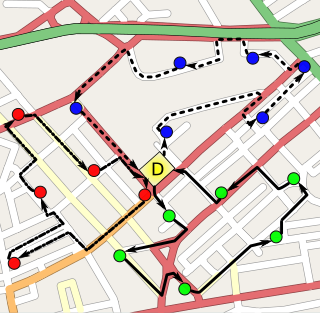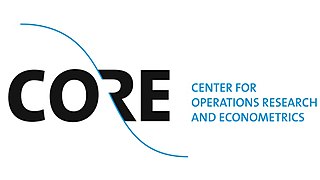The Master of Public Policy (MPP), is one of several public policy degrees. An MPP is a master's-level professional degree that provides training in policy analysis and program evaluation at public policy schools. The MPP program places a focus on the systematic analysis of issues related to public policy and the decision processes associated with them. This includes training in the role of economic and political factors in public decision-making and policy formulation; microeconomic analysis of policy options and issues; resource allocation and decision modeling; cost/benefit analysis; statistical methods; and various applications to specific public policy topics. MPP recipients serve or have served in the public sector, at the international, national, subnational, and local levels and the private sector.
Business education is a branch of education that involves teaching the skills and operations of the business industry. This field of education occurs at multiple levels, including secondary and higher education
Quantitative psychology is a field of scientific study that focuses on the mathematical modeling, research design and methodology, and statistical analysis of psychological processes. It includes tests and other devices for measuring cognitive abilities. Quantitative psychologists develop and analyze a wide variety of research methods, including those of psychometrics, a field concerned with the theory and technique of psychological measurement.
Business mathematics are mathematics used by commercial enterprises to record and manage business operations. Commercial organizations use mathematics in accounting, inventory management, marketing, sales forecasting, and financial analysis.
A Bachelor of Economics is an academic degree awarded to students who have completed undergraduate studies in economics. Specialized economics degrees are also offered as a "tagged" BA (Econ), BS (Econ) / BSc (Econ), BCom (Econ), and BSocSc (Econ), or variants such as the "Bachelor of Economic Science".

Bendheim Center for Finance (BCF) is an interdisciplinary center at Princeton University. It was established in 1997 at the initiative of Ben Bernanke and is dedicated to research and education in the area of money and finance, in lieu of there not being a full professional business school at Princeton.
Economics education or economic education is a field within economics that focuses on two main themes:
A master's degree in quantitative finance is a postgraduate degree focused on the application of mathematical methods to the solution of problems in financial economics. There are several like-titled degrees which may further focus on financial engineering, computational finance, mathematical finance, and/or financial risk management.
The Guanghua School of Management, Peking University (北京大学光华管理学院) is the business school of Peking University, a public university in Beijing, China.

The Master of Finance is a master's degree awarded by universities or graduate schools preparing students for careers in finance. The degree is often titled Master in Finance, or Master of Science in Finance. In the U.S. and Canada the program may be positioned as a professional degree. Particularly in Australia, the degree may be offered as a Master of Applied Finance (MAppFin). In some cases, the degree is offered as a Master of Management in Finance (MMF). More specifically focused and titled degrees are also offered.

The Robert Day School of Economics and Finance (RDS) at Claremont McKenna College is an economics school, and the only graduate program at Claremont McKenna College. The Robert Day School emphasizes coursework that blends theory and practice. The undergraduate programs offer majors in economics and economics-accounting, and a sequence in financial economics. RDS also offers a specialized full-time master's degree in finance as well as administering the Robert Day Scholars Program. In contrast to any other liberal arts college, the offerings include a broad spectrum of core and elective courses in finance and accounting. The course is designed to develop the individual student's analytical, quantitative, and communication skills.
A master's degree in financial economics provides a rigorous understanding of theoretical finance and the economic framework upon which that theory is based. The degree is postgraduate, and usually incorporates a thesis or research component. Programs may be offered jointly by the business school and the economics department. Closely related degrees include the "Master of Finance and Economics" and the "Master of Economics with a specialization in Finance". Recently, undergraduate degrees in the discipline are offered. The degree is gaining in recognition: Oxford's Financial Economics MSc is first ranked worldwide amongst all Masters in Finance programs.
PhD in management is one of the highest academic degrees awarded in the study of management science. The degree was designed for those seeking academic research and teaching careers as faculty or professors in the study of management at business schools worldwide.

Applied mathematics is the application of mathematical methods by different fields such as physics, engineering, medicine, biology, finance, business, computer science, and industry. Thus, applied mathematics is a combination of mathematical science and specialized knowledge. The term "applied mathematics" also describes the professional specialty in which mathematicians work on practical problems by formulating and studying mathematical models.
Quantitative analysis is the use of mathematical and statistical methods in finance and investment management. Those working in the field are quantitative analysts (quants). Quants tend to specialize in specific areas which may include derivative structuring or pricing, risk management, investment management and other related finance occupations. The occupation is similar to those in industrial mathematics in other industries. The process usually consists of searching vast databases for patterns, such as correlations among liquid assets or price-movement patterns.

Toulouse School of Economics is a school of economics, affiliated with Toulouse 1 Capitole University, a constituent college of the Federal University of Toulouse Midi-Pyrénées. It is located in the city of Toulouse, France.
The Tepper School of Business is the business school of Carnegie Mellon University. It is located in the university's 140-acre (0.57 km2) campus in Pittsburgh, Pennsylvania.
The European Joint Master degree in Economics provides a rigorous education in fundamental quantitative tools by combining economic theory with related quantitative disciplines such as Econometrics, Finance, Actuarial Science, Probability, Statistics, Mathematical Modeling, Computation and Simulation, Experimental Design, and Political Science, managed by consortia of higher education institutions from the European Union.

The Center for Operations Research and Econometrics (CORE) is an interdisciplinary research institute of the University of Louvain (UCLouvain) located in Louvain-la-Neuve, Belgium. Since 2010, it is part of the Louvain Institute of Data Analysis and Modeling in economics and statistics (LIDAM), along with the Institute for Economic and Social Research (IRES), Louvain Finance (LFIN) and the Institute of Statistics, Biostatistics and Actuarial Sciences (ISBA).





